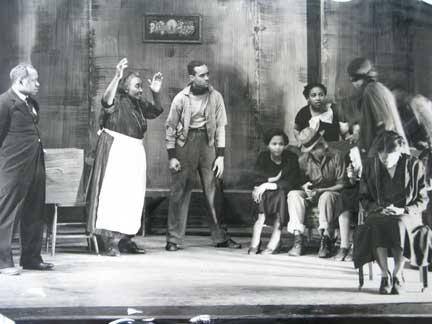CEOs Talking About Racism is Good. Telling its Story is Better.

In 1935 Harry Hopkins, the head of the Works Progress Administration, picked Hallie Flanagan, a Vassar College professor, to run a federal project that gave away money, no strings attached. Four years later Congress killed the program. The Republicans lambasted it as communist-inspired, un-American, and a cog in President Franklin Roosevelt's propaganda machine. Short-lived and unloved or not, it's time for Harry Hopkins' idea again.
The Federal Theater Project (FTP), part of Roosevelt's New Deal, created jobs for unemployed writers, actors, directors, stagehands and technicians. In the Great Depression, their productions informed and entertained Americans. Over four years, one-in four, some 30 million people, came to watch. As Americans from coast to coast confront the impact of racial injustice following George Floyd's murder, such powerful storytelling couldn't be more valuable today.
Let's stipulate that in 2020, a bill proposing that the government pay for plays would be dead-on-arrival on Capitol Hill before congressional tushies warmed their hearing room seats. In a Washington where Republicans check under their beds nightly for mythical Antifa intruders and the President still rifles his desk looking for the Kenyan birth certificate his predecessor left behind, the partisan attacks would make the criticism of FDR's FTP 80 years ago look mild by comparison.
But it's crucial to acknowledge another reality: for corporate leaders who are expressing their outrage over events and sympathy for racism's victims, words alone, however heartfelt, simply won't do the trick. It isn't their personal sincerity or previous efforts that are in question. The issue is understanding the pervasiveness of the problem. Democratic Rep. Anthony Brown, Maryland's former lieutenant governor, a retired Army colonel, and an African American father of three, put it well.
"This (moment) is not new in this country," Brown, the vice-chairman of the House Armed Services Committee, explained last week to Vox. "It's just revealing and exposing what we know and understand to be the inequalities in our country, brought about by racial bias and just blatant racial discrimination in people's conduct, their practice, and in policies. You see these disparities playing out in our schools, our prisons, our health system, our economy, and during this pandemic." That's where Harry Hopkins' idea can—and should—come in. In fact, the black entertainment industry has already pointed the way.
Last week, "Blackout Tuesday," an anti-racism campaign in the music industry, spread throughout the entertainment world. After an initially important, symbolic act—stopping the music business for a day to honor George Floyd—its participants have called for amplifying black voices and their anti-racism messages. Entertainment and media companies have responded—for example, featuring black artists' playlists and banners on their sites linking to music feeds. Performers also have encouraged HBO and other outlets to present works by black writers and filmmakers who have depicted African American society and its struggles.
Whether "Blackout Tuesday" will be more than a social media nova remains to be seen. But for media industry leaders who say they understand the importance of this moment, its creative ideas present a unique opportunity. The raw material to help Americans understand the black experience is in their vaults and on their servers. So is the technology to deliver its stories to Americans as they try to talk about racism and injustice in companies, classrooms, churches and communities from coast to coast.
The value of such storytelling can't be overestimated. Take the current CEO mantra encouraging their employees to empathize with black colleagues and to discuss difficult race issues. The call is praiseworthy, not to mention overdue. But those conversations aren't going to occur easily whether in open-bay offices or on factory floors. Nor are they necessarily going to be fair in apportioning the burden as well as the risks in any back-and-forth. As a black Microsoft executive last week told the Wall Street Journal, "We know what's going on already and it's not our job to educate everyone."
That's why stories matter. Black dramatists, filmmakers, actors, and artists have created an extraordinary body of work. As a catalyst for discussion, their stories not only depict the reality of black life in America; they eloquently portray its human experience. From the Pulitzer Prize winning plays of August Wilson and Lynn Nottage to the films of Spike Lee, John Singleton, and Barry Jenkins, to name only a few, the media industry has a wealth of dramas to stage, screen and stream. The question is: will its corporate leaders rise to the task?
Putting the right people at the table shouldn't be hard. From the media giants that own and deliver entertainment, social media and streaming services to the artists themselves, the choices for a consortium to provide the public service are obvious. So arguably is the obligation to underwrite its cost. In 2019, the telecommunications industry's 111 members spent $101 million on lobbying to advance their interests in Washington DC and state capitals. Putting their money where their mouth is to address racial injustice shouldn't break their bank.
In fact, Harry Hopkins offers some guidance here as well. His Federal Theater Project defined diversity, establishing a half-dozen ethnic units across the country including Yiddish, French and German groups to produce, perform and entertain. The Negro Theater Project (pictured at top), the FTP's most successful, made its mark in 23 cities, providing a major boost to African American theater in the Depression. Through its artists, it also brought something else: the story of the black experience to its audiences.
"If history were taught in the form of stories, it would never be forgotten." Rudyard Kipling wrote. Current events just might have led Britain's poet of empire to add, if we don't understand its stories, history's lessons will never be learned.
Photo courtesy of Kent Harrington
Click the social buttons to share this story with colleagues and friends.
The opinions expressed here are the author's views and do not necessarily represent the views of MediaVillage.com/MyersBizNet.


